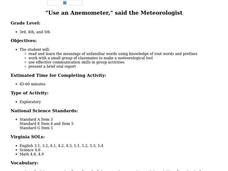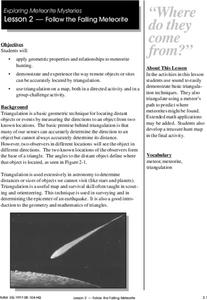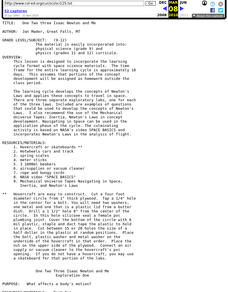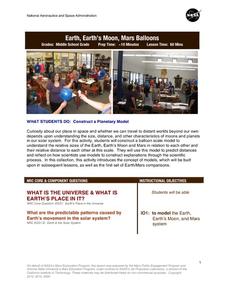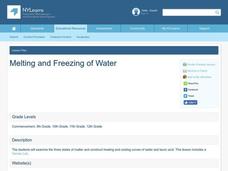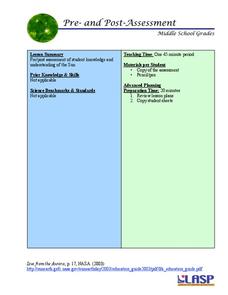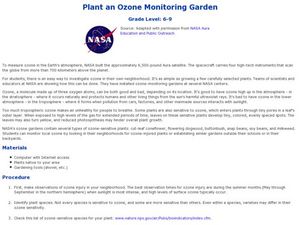Curated OER
Understanding Cloud Formation
Students read and relate the poem, "Clouds" by Aileen Fisher to a demonstration on cloud formation. They create clouds in jars using ice water and matches then discuss the ways clouds can be used to predict weather.
Curated OER
Observing, Describing, And Identifying Contrails
Students compare the three types of contrails that are produced by aircraft exhaust. They examine pictures of contrails on the internet to classify each as short lived, persistent or persistent spreading. They then sketch examples in...
Curated OER
"Use an Anemometer," said the Meteorologist
Pupils work in groups to make an instrument the Meteorologists use to measure the speed of the wind after the teacher reads them a poem about the wind. Students then review vocabulary that they studied from their lesson.
Curated OER
Follow The Falling Meteorite
Middle schoolers investigate the supposed traveling path of a meteorite. They use sound in order to triangulate the path. The results of the experiment are written on a map to display the path of the meteorite. The culminating activity...
Curated OER
Mars Pathfinder Egg Drop and Landing
Students construct a pathfinder that could land an egg safely. In this physics lesson, students explain the factors affecting the dynamics of falling objects. They evaluate their pathfinder design.
Curated OER
One, Two, Three--Isaac Newton and Me
Students experiment to develop understanding of Newton's Laws and how they apply to space travel in this ten day instructional activity sequence.
Curated OER
Ozone: The Earth's Security Blanket
Students work in groups to define and research the terms: ozone, troposphere and stratosphere. Students watch videos, conduct Internet research, participate in discussion groups and complete worksheets.
Curated OER
Forces, Controls And Aircraft Systems
Students are introduced to the physics of flight through video and PowerPoint presentations. They construct and fly model gliders and compete for height, distance, time, etc.
NASA
Earth, Earth’s Moon, Mars Balloons
Very specific diameters are given for blowing up three different balloons to represent, in scale, the moon, Earth, and Mars. In groups of three, amateur astronomers explore scale measurements and distance in space.
Curated OER
Modeling the Electromagnetic Spectrum
Examine the concept of an electromagnetic spectrum with your students, as they observe a demonstration of a model, construct and compare a different model of the spectrum commonly used in textbooks, and construct their own models of the...
Curated OER
Melting and Freezing of Water
High schoolers examine the three states of matter. They identify the segments of heating and cooling curves. Students analyze data and create a graph to determine the freezing and melting temperature of water.
Curated OER
Fusion Confusion
Students are introduced to three types of energy transfer: conduction, convection, and radiation. They model the scientific process of fusion to become with the sun and how it produces energy.
National Center for Case Study Teaching in Science
To Boldly Go, or Not
Here is a different way to combine social studies and science. Have your high schoolers read a passage about the 2004 vision for space exploration and then discuss the practicality, costs, and reasons for returning to the moon. Then, the...
NASA
Solar System Scale & Size
Use a variety of whole fruits to represent the different planets in the solar system to introduce scale sizes to your math or space science class. They follow suit by creating a non-scaled model of the solar system using specific-colored...
PHET
The Sun: Pre- and Post-Assessment
Want to see how far pupils have come since the beginning of the unit? This activity is designed to be a pre- and post-assessment for a unit on the Sun. The first in a series of 18 that can be combined to form a complete unit. Two...
Curated OER
Chemosynthesis for the Classroom
Explorers set up Windogradsky columns with local mud so that they can culture microorganisms. After three and six weeks they make observations of the mud and the organisms growing in it. In this way they observe succession and relate...
Curated OER
Explosive Ideas: Oregon quarter reverse
Explore Earth and her amazing layers with this lesson on planetary change. Students will research the ways in which Earth's layers cause change. They will complete a "Tectonic Puzzle" and use a worksheet to answer questions about Earth's...
Curated OER
Strange New Planet
Fourth graders gather data and simulate a Mars spacecraft mission using multi-sensory observations.
Curated OER
Basics Of Foreign Trade And Exchange
Have your scholars read a handout related to the foreign trade market and how there is an exchange of goods. They read the information as a research assignment and make connections as to how the market fits together.
Curated OER
ESL Open Cloze Worksheet- English Grammar
For this ESL open cloze worksheet, students fill in the blanks in 8 sentences. They use words related to English grammar, vocabulary words, to fill each blank.
Curated OER
Proportionality, Ratios and Constant Variation
Students use Scion Image to estimate the proportion of space images. In this proportion lesson, students investigate the online site of Image of the Orbitor and relate the dimensions and sizes to known sizes.
Curated OER
Reading: An Amazing Swimsuit
In this inventions worksheet, students read a one page text about the new type of swimsuit used in the 2008 Beijing Olympics called the Speedo LZR Racer. Students answer 10 true or false questions about the passage.
Curated OER
Plant an Ozone Monitoring Garden
Students create a garden. In this ozone lesson, students discuss ozone injury, identify plants sensitive to ozone, and then plant their own ozone garden.
Curated OER
Ready, Set, Go!
Middle schoolers predict if the height of a ramp affect how far an object travels. They design and conduct an experiment to test their predictions. The results are recorded and a graph is created to show the relationship between ramp...




